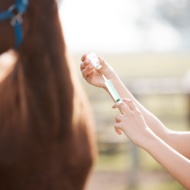Livestock attack DNA project moves to next stage
The project is being run by Liverpool John Moores University.
Canine DNA collecting kits are being distributed as part of a research project to tackle livestock worrying.
The Canine DNA Recovery Project, run by Liverpool John Moores University, is working with farmers, police forces, and the veterinary profession to improve the collection of dog DNA from livestock that has been attacked.
The kits are being distributed in 10 regions through participating police forces, NFU Mutual, the National Sheep Association, and Farmers Union Wales. They include swabs, scissors, tape, and detailed instructions on collecting DNA.
It is hoped that eventually the kits will be used to help prosecute the owners of dogs involved in livestock worrying.
A panel discussion on the project took place at the Royal Welsh Showground on Wednesday, 24 July.
Those attending heard from Nick Dawnay, the forensic scientist leading the project, as well as from Carmarthen MP Ann Davies, beef and sheep farmer Wyn Evans, and Rhys Evans of North Wales Police’s rural crime team.
FUW’s regional vice-president Anwen Hughes, who chaired the discussion, said: “I have been keeping my eye on the developments of this project since its inception and have been involved in many of the discussions regarding livestock worrying issues in Wales, on behalf of FUW members.
“It is difficult to unsee the horror left behind after dogs have attacked and disfigured sheep in a field. It impacts our own mental health and well-being, in addition to the cost implications it has on the business. It is a harrowing situation to be in.”
Image © Shutterstock



 Zoetis UK has apologised for a supply shortage of Equip Artervac, caused by a manufacturing issue.
Zoetis UK has apologised for a supply shortage of Equip Artervac, caused by a manufacturing issue.